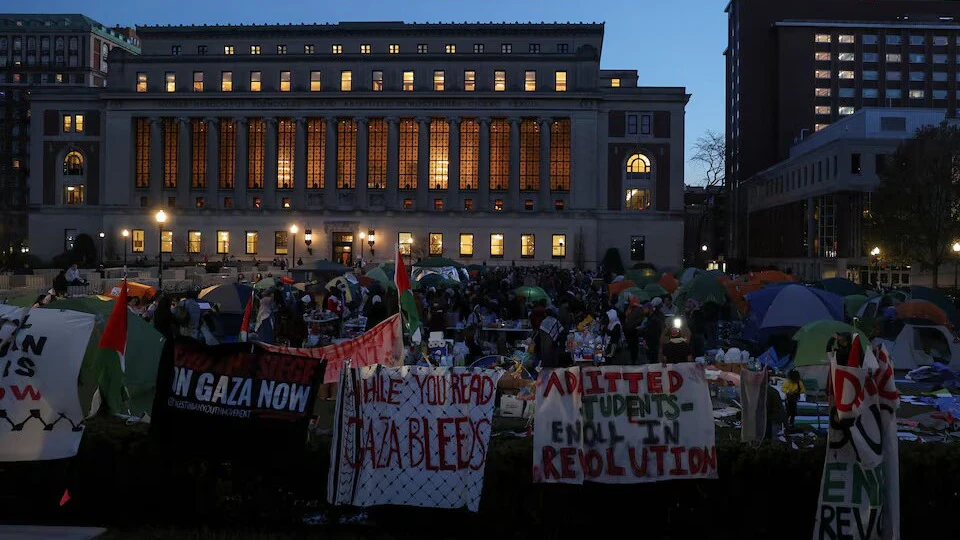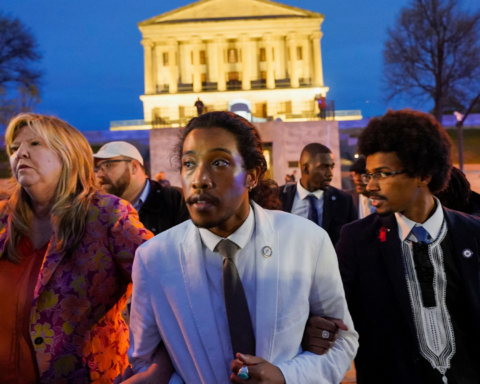By Lex McMenamin
College students have been at the forefront of the movement for a ceasefire in Palestine since Israel’s ongoing incursion of Gaza after the October 7 Hamas attack. As soon as organizing for that movement began, there was backlash against it, including doxxing and harassment at Harvard, attempted state-level bans of Students for Justice in Palestine (SJP) chapters in Florida, and also the banning of protests and SJP chapters at other universities. In Vermont, Palestinian college students on a walk, wearing kuffiyehs, were shot at during Thanksgiving break. (The reported shooter, who has pleaded not guilty to attempted second-degree murder, remains in jail as the case proceeds.)
The apparent suppression on campuses, while currently intensifying, isn’t new or recent: For the past several years, the organization Palestine Legal has represented and supported student organizers facing similar backlash. A representative for Palestine Legal tells Teen Vogue that, since October, the group has received “over 720 reports of suppression of Palestinian rights advocacy on campuses across the country.”
Meanwhile, the movements for ceasefire and Palestine are credited with reanimating student organizing, as well as pushing President Joe Biden’s policy stance on US support for Israel. That outcry has manifested in Uncommitted campaigns that have built momentum in presidential primaries across US states, and may also be pushing Biden to shift his policy.
But these same organizing movements are seeing pushback on forms of protest that are historically common on campuses. Some students have been suspended or arrested for occupying campus buildings. In other instances, the backlash comes after students pushed to hold student body votes on divesting university funds from Israel or Israeli companies; at Vanderbilt, Ohio State, and Harvard, attempted referendum votes on the matter were canceled, suspended, or indefinitely postponed.
Vanderbilt University
In protest of the decision to remove the vote on divestment from student ballots, Vanderbilt students occupied a campus building; on April 5, three Vanderbilt students were expelled, 22 were put on probation, and one was suspended over the action. (During that same sit-in, a local Nashville reporter was also arrested.) These students were given 10 days to appeal the decisions.
Among the three students expelled from Vanderbilt is Jack Petocz, who, in 2022, was honored by Teen Vogue and them for his organizing as a high school student against Florida’s Don’t Say Gay policies. “Vanderbilt is afraid of student organizing on campus,” Petocz, a freshman who expects to be the first in his family to receive a bachelor’s degree, tells Teen Vogue a few days after receiving his expulsion notice. “I believe that I got into Vanderbilt on the merits of my past organizing, but now I’m being suppressed for using and finding community in activist circles at Vanderbilt.”
Petocz says he’s been denied access to his dorm and to campus dining halls, where Vanderbilt has a mandatory meal plan. “They’re trying to pin me as the leader of this collective, a leaderless collective, just because I’m incredibly vocal on social media and my past,” he says. “I feel like I’m being discriminated against.”
Vanderbilt student Ezri Tyler is among the 22 students put on probation, who, she says, are being denied the ability to apply for campus jobs and RA positions, hold club-leadership positions, and to study abroad. “Free speech [at Vanderbilt] very much has limits; speech is only free if they like what you’re saying,” Tyler tells Teen Vogue. “Understanding that this is a purposeful tactic to try to isolate, divide, and make us feel fearful is really powerful and important, and then ultimately strips a lot of the power of what this suppression is meant to do.”
In an email to Teen Vogue, a Vanderbilt spokesperson cites federal privacy laws in declining to comment on the students’ individual cases. An April 5 statement from the university about the punishments reads in part, “The gravity of this situation and these outcomes weighs heavily on those of us charged with carrying out our responsibility as leaders; we fully understand that student choices and decisions can lead to serious and costly consequences.”
At Pomona College in California, 20 students were arrested by riot police on April 5 after they occupied a campus building in response to the removal of a pro-Palestine art installation from campus. Amanda Dym, a student at Scripps, one of Pomona’s sister colleges, was among those arrested, which they describe as a “brutal show of force.”
“I was obviously very upset and angry at the school’s decision,” Dym tells Teen Vogue. The protesters want the school to divest from weapons manufacturers and disclose all of its investments. “Rather than listening to these demands, which were fortified in a referendum vote on campus where [78%] of students voted in favor of divestment, they chose to militarize campus in this way.” Since the arrests, Dym has been banned from Pomona’s campus, where they are currently taking two courses.
In a public letter, Pomona College President Gabrielle Starr alleged that the organizers refused to identify themselves and “verbally harass[ed]” staff. Starr confirmed that any participants who were Pomona students would be subject to immediate suspension, and those from other colleges in the Claremont consortium would be “banned from Pomona’s campus and subject to discipline on their own campuses.”
In response to Teen Vogue’s request for comment, a Pomona spokesperson directed attention to a statement on the Pomona site, which refers to “masked, unidentified individuals who refuse to identify themselves” and later describes as “eight Scripps College, seven Pomona College, and five Pitzer College students.”
Columbia University
At Columbia, at least four students were suspended indefinitely and evicted from university housing in relation to a Resistance 101 teach-in; a representative for the Columbia University Apartheid Divest coalition said the number is currently five.
Columbia’s campus has seen months of controversy and conflict, including an alleged chemical attack against pro-Palestine students during a January protest. According to Inside Higher Ed’s reporting, these most recent suspensions come as “the university’s response to campus antisemitism is under investigation, not only by the House committee but also by the US Department of Education’s Office for Civil Rights, which is also investigating numerous other institutions.”
In a public statement, Columbia University president Minouche Shafik called the Resistance 101 event “an abhorrent breach of our values,” claiming the event “featured speakers who are known to support terrorism and promote violence.” Students have not made any public comment on the nature of the event.
“It’s no coincidence that they started ramping this up just two weeks before the congressional hearing,” Columbia social work student Aidan Parisi, who received a suspension, tells Teen Vogue. “The reason we are suspended is not because of any event, it’s because we’re refusing to participate in an arbitrary and distasteful investigation.”
Parisi says two private investigators came to their door in relation to a Columbia investigation; Parisi declined to participate. “They are basically holding our housing, our careers, our academic careers, access to medical care overhead to force us into meeting with two private investigators,” Parisi explains. “So that is why we’re suspended, for refusing to go into a meeting where we don’t know what exactly is going to happen at this meeting.”
In response to a request for comment from Teen Vogue, a Columbia spokesperson says, “A number of students were suspended in connection with the Resistance 101 event. The University continues to work through the disciplinary process.” They also share a letter sent to the students who received suspensions, which is addressed to “student leader of a group that was identified as a member of the non-recognized coalition of student organizations, Columbia University Apartheid Divest (“CUAD”) in an article published by CUAD in the Columbia Spectator,” referring to a November 2023 article.
In the fall, as reported by the Intercept’s Prem Thakker, protests at the University of Chicago, Brown, the University of Michigan, and UMass Amherst were met with arrests and disciplinary hearings, and students were denied the opportunity to study abroad the following semester. This spring at Northwestern, two students, both of whom are Black, faced criminal misdemeanor charges after they made a parody version of the campus newspaper focused on Gaza; those charges were dropped after public outcry.
As Charles H.F. Davis III, assistant professor in the Center for the Study of Higher and Postsecondary Education at the University of Michigan, told Inside Higher Ed, “Who’s doing most of the protesting? Overwhelmingly, it’s students of color — Black students, in particular — and at this moment we see a lot of Arab and Palestinian students. You can’t have an institution that espouses a commitment to democratic representation and political engagement that doesn’t provide and hold space for political dissent.”
The students who speak with Teen Vogue say they have no plans to stop advocating for a ceasefire and for Palestine. “We stand unwavering in our demands, and we know that the things that have historically toppled apartheid states is pressure from institutions, like academic institutions,” says Dym, who adds that her Judaism is part of what led her to join the campus movement.
“What I’ve experienced over the past few months has been worse than what I experienced in Flagler County, Florida,” Petocz tells Teen Vogue. “I never expected to be going through something like this for simply peacefully protesting in my own university.”


